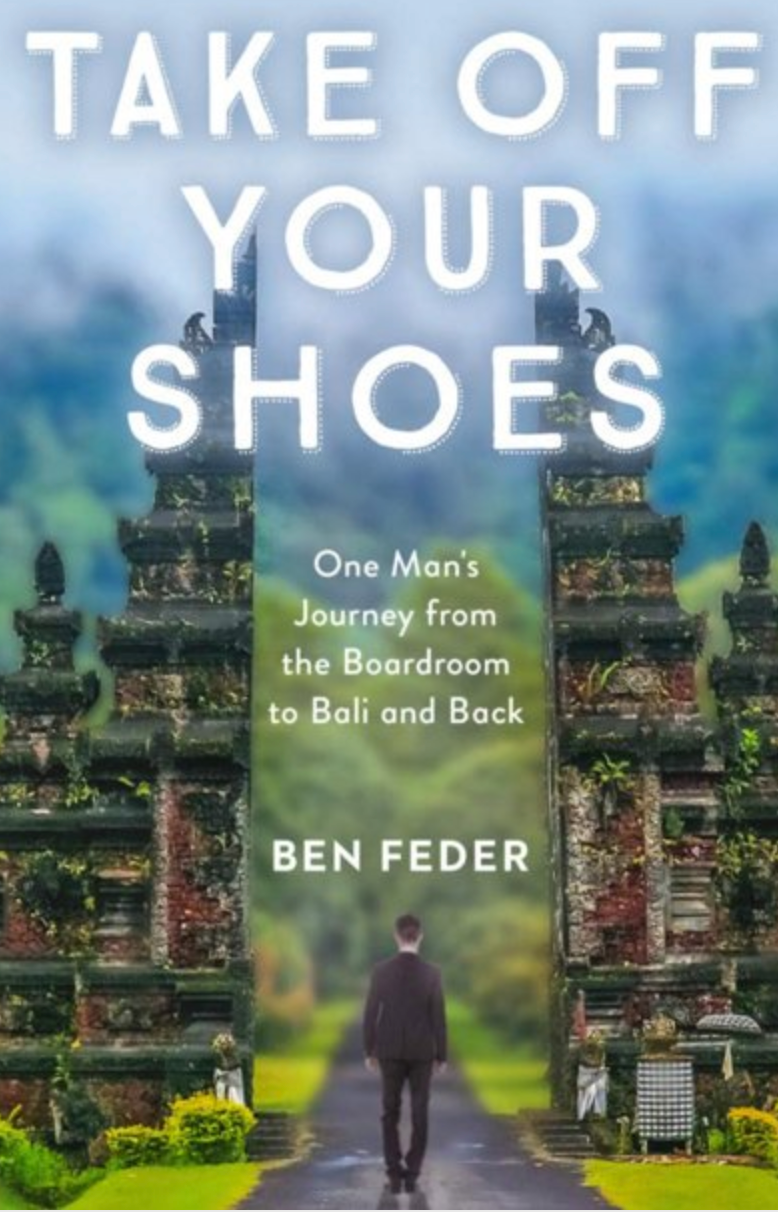Four Memorable Quotes from “Take Off Your Shoes” by Ben Feder
So why did I choose this book to be the first review on my site? After all, we all try to get in decent reading list each year, some because they are academic, some out of curiosity, and many just because they are mind candy. What then made this one memorable? The title and back cover copy? Well…. yes, at first that is exactly what it was.
To be honest, when I first picked up this book, I thought it would be another one of those typical self-help books. You know, a formula book about escape – leaving the corporate world, traveling to an exotic location, and then finding your one true calling. And since I was getting ready to get in line to board for my 50th American Airlines flight of the year (it was June), and was standing in Barbara’s Books at ORD killing time, I thought, why not?
But as I got the final few pages, I began to realize that Ben Feder had done something very different. Sure, the book still has all of those plot lines I had expected, but there were other inspirational messages buried within in. Throughout the book, as the title and back copy suggested, Ben had traveled to Bali and then asked himself some important questions about who he is, and what he could become, However, what inspired me was not that aspect of his journey , but rather, how he focused on challenging himself to actually move outside of his mental comfort zone.
So, in the spirit of what I believe that Ben was trying to accomplish, here are my 4 favorite quotes from his book, and what they meant to me:
““I had no expectations of myself. What happened was pure interest, pure curiosity, and pure amazement at what I could perceive simply by being aware and engaged””
Ah, expectations, the downfall of every relationship, including the most important ones – the ones with yourself.
Ben has hit on something here – if you do anything with expectations, you are missing the purpose of the leap. You are not going to experience anything truly if you are tethered to an expectation. If you are going to leap, then you need to let go of the expectations. Leaping with expectations is like bungy jumping, the thrill is there, but eventually you end up exactly where you started.
In Ben’s case it was painting, he never expected to be a good painter, but that wasn’t the point. It was the moment he was in while painting and the experience of being alive to something completely different. I can relate here. Too many times I have taken on a new task, or hobby, or passion, with expectations on what would be the outcome. In doing so, I missed the moment, and the experience of what happens when your feet leave the ground for the first time.
“Intention was doing something deliberately so that it has meaning”
This was an odd quote, buried inside of a larger conversation on Ben’s focus on yoga within the book. But something about it activated a memory within me, and I must have gone back half a dozen times and reread the passage.
I remember standing in a field with the father, who, with a baseball bat in hand, kept hitting pop fly and ground balls at me as the daylight began to fade. I wasn’t the best baseball player, so I tended to miss a lot of these. When I missed a grounder, my Dad would yell, “Two steps in and twice as hard”. Like that was effective. It was terrible. The fly balls were the worst, I could already not see due to the onset of twilight (and I wore glasses at the age of 6), so I kept praying that either God would drop the ball in my glove, or mercifully knock me out. As usual, neither happened.
What was missing? Well, besides God with a glove, it was that I had no intention of being a great baseball player. Fuck, I still can’t go watch a baseball game and keep my attention for more than a few minutes. So, without being deliberate in what I wanted, the hours on the field were meaningless.
Although I never knew it, when I look back at what I have accomplished, and where I have failed, it has come down to intention. I always intended to be a writer, and through deliberate actions, have achieved that goal in my life.
“Most people actually believe their own thoughts. But thoughts are not facts. They’re just thoughts. They do not reflect reality”
I am going to have to make this the focus of another essay, or maybe even a series of books! As a person who has suffered from an anxiety disorder since, well, forever, I realize that my brain has the ability to project an infinite number of timelines for anything in my life that I may be momentarily focusing on. Venti coffee with almond milk? Yeah, my mind can play with than one at 2 am for an hour. Give it a real critical decision, and it can project a thousand timelines of how I will fuck it up, and haunt me for countless nights.
Reality is what we make it, and if we let our thoughts, or especially our anxieties take control, then we will end up in the reality we predicted. Adam Savage from the Mythbusters often used a great quote from the Dr. Who show which said “I reject your reality and substitute my own”.
If reality is what we think, then sometimes we need to reject our thoughts to redefine our reality.
“Nothing is permanent, all things change. The secret is to lean into it and experience it fully”
Just to place this in context, this is actually from Ben’s wife after they have returned to the US, and the reality of life has set in again. Normally, this would be one of the “of course” moments of the book. Of course reality has hit, you aren’t in Bali anymore, what were you expecting?
Then, for all of us, COVID-19 hit. Now, we all are experiencing change in ways that we could never have imagined in our darkest dreams. There are discussions of the “new normal” and “returning to normality” as people try to predict the future and define our reality.
Seriously, all of that is irrelevant, the reality is that all we have is #thismoment, and really, upon finishing the book, I recognized that that was what Ben was getting at. He had learned to live in this moment. Sure, being in Bali was a nice setting, but it wasn’t the external environment, it was the internal.
We can’t control the external world, it is too vast, too many variables, too many decisions. Our brains can’t focus on that type of uncertainty, all we can do is to deal with this moment, lean in, and experience the journey.
And that is a powerful realization. Enjoy the book.

